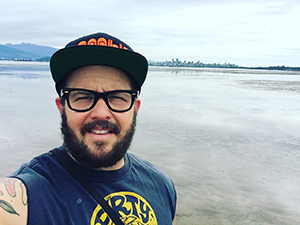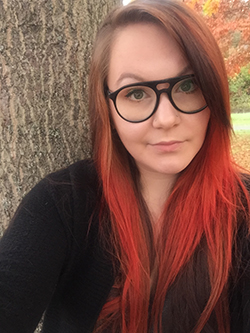Stay Weird: Cooper Lee Bombardier in Conversation with Kyra Kristmanson

Cooper Lee Bombardier, whose essay "Half as Sensitive" appears in the Malahat Review's Winter 2018 Queer Perspectives Issue, discusses research, revisions, and what it means to be "real" in his Q&A with Malahat Review Editorial Assistant Kyra Kristmanson.
Cooper Lee Bombardier is an American writer and visual artist currently living in Canada. His writing appears in many publications and anthologies, such as The Kenyon Review, Ninth Letter, CutBank, Nailed Magazine, Longreads, BOMB, and The Rumpus; and recently in the Lambda Literary Award-winning anthology, The Remedy: Queer and Trans Voices on Health and Health Care, and the Lambda-nominated anthology, Meanwhile, Elsewhere: Speculative Fiction From Transgender Writers, winner of the 2018 American Library Association Stonewall Book Awards Barbara Gittings Literature Award. Learn more at www.cooperleebombardier.com.
The way you weave the threads of your essay “Half as Sensitive” together is beautiful. Like a spider web, building with each pass over the last string of narrative silk. Was there a specific outlining process that allowed you to achieve that?
I didn’t outline at all. It was something I just started to write and allowed to unfold as I went. It was a completely intuitive process, but also an act of accretion as well. I first began writing this piece over four years ago, while I was finishing up an MFA program and teaching and working night shifts as security. I kept thinking about how weird it was that several times a week I entered a nuclear reactor, I mean, it’s kind of unusual. Around the same time I was chasing a small obsession in my writing: I’d read an aside about radiation testing on alligators decades ago at a nuclear facility not far from where I was living at the time, and there was something so resonant about it, the vulnerability of the alligators and their displacement: they don’t belong in the Pacific Northwest. Their health was at the mercy of powers far beyond their control. Meanwhile, every week that I showed up to work and put on my uniform, I transformed from a professor into a strange human reflecting pond where I observed the various projections of people onto me. When I first approached the piece, I allowed myself to be fragmentary, nonlinear, and associative in a way I wasn’t typically writing and the exercise felt fruitful, to me at least. This is a piece that I’ve submitted many times and that has been rejected many times. I’d think, “it’s too weird,” and let it sit for a while, but then my faith in the piece never dampened, so I’d open it up again, Save As, and revise the piece. If anything, I wanted there to be a faint tone, like a distant bell, that sounded in each segment, and wanted to experiment with that being the connective tissue aside from what I think is the sense of anxiety, alienation, and what it means to be “real” that wends throughout the essay.
You add complexities to things we tend to simplify in our minds: a fingerprint resembles a national park, a uniform contains a person, a last name carries the weight of history. Did you give thought to these themes separately before writing “Half as Sensitive,” or did they surface as you were writing?
Again, much of the process of the piece was just intuitive. Some details and images of the piece emerged through the writing process, which is not unusual. Many of us think through the writing itself, right? Sometimes it is only through the writing that we figure out what we are trying to say. As I said, I revised this essay many times, thought of it as something of a sifting process. I like what Mary Karr says about revision as a “lapidary” process. Each time I went back to the essay, I was able to tease out a deeper note or thread and tried to connect it with the other concerns of the piece. Some of the connections are oblique, tangential: my last name has to do with bombs, literally. The deadly materials for the atom bomb dropped on Nagasaki were created in the place that tested radiation on alligators (and humans). The waste from this nuclear facility gets transported back to New Mexico (where I lived for eight years) miles away from the site of the very first nuclear bomb tests. It was an intuitive process of chasing obsessions and pulling on threads to see where they lead.
There is an extensive list of scientific details in this piece, tucked between anecdotes of a much more personal nature. Did that juxtaposition develop organically, or was it orchestrated during your writing process?
I conducted some formal research on the alligator experiments and originally wanted to write up a more traditionally journalistic feature on the Experimental Animal Farm. I even tracked down the lead scientist, who is now in his 90s, to interview him about the EAF. I spoke with him on the phone. At some point I started to weave my research with these other experiences and observations, from work, from life. The very first iteration of the essay was deemed unsuccessful by a workshop leader, but I felt so compelled by it and reluctant to let it be less weird than it wanted to be. But with each draft, I actually brought in more and more personal revelation. Whenever I teach or participate in a workshop setting, that’s actually something I often find myself advising to other writers: I always want the author to be more present in the piece as a narrator/character. I tend to be more drawn to and trusting of that kind of narration.
You mentioned “the scientists of the [Experimental Animal Farm]: they wanted to look beneath the skin. They wanted to see what was inside.” Admirable, in the context of the metaphor—getting to know a person rather than leaving your understanding of them at basic assumption—but could their actions also be considered as invasive, damaging, and entitled data mining?
Oh, of course! There is an admiration to some extent of the single-minded drive and sense of purpose of scientists no matter the collateral damage here, especially in the face of the narrator’s own lived sense of inbetweenness, but also there is a facetiousness to the statement, because clearly, I identify with the alligators most of all. One should practically hear me cheering at the end for the ones who’d escaped and had never been recovered.
I really appreciated how the piece didn’t centralize around one aspect of your identity. There is certainly some pressure on marginalized writers to produce certain kinds of narratives, restricting creative expression to expected parameters in terms of content, theme, or political statements. Is there any advice you might offer to writers who are struggling with those constraints?
Well, I think that for each writer who does not write from a hegemonic standpoint will figure out for themselves how to best articulate their unique and crucial voice, so I am hesitant to sound prescriptive. But I will say: write for a generously imagined audience, one that will do the work to keep up with you, rather than slow yourself down belaboring the teachable moments. Let those come in context, in scene, in dialogue. Let the devices and tools of literature carry some of that work for you so that you can say exactly what you need and want to say. Stay weird. Follow your obsessions. Make your own forms.
Lastly, I’d like to ask if you have any particular reading recommendations! Writers who inspire you, personally. Your favourite books, stories, or poetry?
I have so many heroes and inspirations, so I will focus my answer on recent reads. I’ve been reading the books of Alexander Chee lately, and just love his deftness and heart in both creative nonfiction and fiction. I just read Mean by Myriam Gurba, which is a brilliant and funny excoriation on rape culture, which sounds like an impossibility, but her writing, her eye, is unparalleled. Chen Chen’s poetry gives me life! Casey Plett, Andrea Lawlor, and Jordy Rosenberg’s recent novels are extending the known universe of trans fiction. I just did an interview with Sophia Shalmiyev for BOMB, whose lyrical, memoir-in-fragments Mother Winter is coming out in February, and it is a fantastic exploration of diaspora, motherhood, feminist anger, and so much more. If there are any trans authors reading this who have a book coming out in 2019 and want to be interviewed by me, reach out via my website.

Kyra Kristmanson
* * * * * * * *









